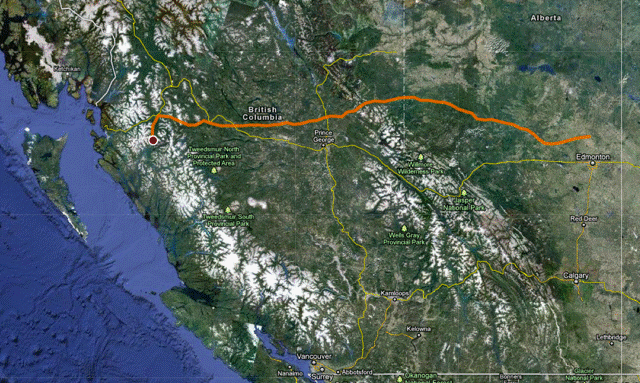January 16, 2012
by Hereward Longley
Recent comments from Joe Oliver are damaging to the Enbridge Northern Gateway pipeline hearings not as much from persuasiveness but from distraction. Like the ethical oil argument, Oliver’s accusations about foreign puppeteering of Canadian environmental groups has distracted from the more important points of debate (tanker traffic, energy security, manufacturing jobs, pipeline ruptures, climate change etc.) and occupied the media spotlight on the opening of the hearings.
Much time was wasted and ink was spilled (including this piece) in discussion of Oliver’s letter. News sources across Canada were clogged with coverage and discussion. The executive director of the Sierra club, John Bennet, made likely his most watched T.V. appearance, hopelessly debated Kathryn Marshall from the Ethical Oil Institute, a display reminiscent of the 2000 presidential debates between Al Gore and George Bush.
The comments polarize Canadians over the incredibly complex issues of economy, energy security, and environmental protection by saying that if you’re against the gateway you’re against Canada. As a piece of PR it was really quite brilliant but absolutely terrible for the tone and quality of political debate in Canada.
The debate about foreign influence on oil sands policy is an important, though not paramount in the pipeline inquiry. Terry Glavin wrote a great article on the scale and significance of foreign investment in oil sands development. However this article is testament to the power of Oliver’s comments in distracting from more important issues.
One of best direct responses to Oliver’s letter, was from Elizabeth May, the leader of the Green Party. Her letter seeks re-frame the debate to issues of energy security, environmental protection, climate change, and the economy.
But more significantly, May’s letter reveals the power of the aggression of the rhetoric Harper government, as her letter takes remarkably centrist position on environmental policy for a Green Party MP. She does not mention climate change until her last sentence, and her discussion of the need to build refineries in Canada to bolster Canadian energy security and jobs is structured in much the same terms as was former Conservative Alberta Premier Peter Lougheed’s statements in a November interview with the CBC opposing the Keystone XL pipeline.
Yet there are some noteworthy exceptions from Oliver’s media frenzy that deserve much more attention.
Nathan Vanderklippe wrote an article about how the courts and parliament will play the defining role in the Northern Gateway decision, in spite of whatever outcome emerges from the inquiry.
A feature by Ian Brown drawing connections from J.B. Tyrell’s 19th Century surveys of the Athabasca region to Thomas Berger’s 1970s Mackenzie Valley pipeline inquiry and how this legacy can be applied to the Northern Gateway pipeline hearings.
A report published in November, by David Hughes, a geologist who worked for the Ministry of Natural Resources for over 30 years, presents a scathing set of arguments about the Enbridge proposal and the urgent pressures to expand bitumen export infrastructure. He argues that current infrastructure can export the existing and planned production, that the Northern Gateway is unnecessary. Further, he posits that Enbridge figures of projected growth of oil sands production are misleading and speculative, and we are rapidly liquidating the richest surface reserves, meaning bitumen extraction will get significantly more energy intensive and expensive as the resource is developed. The life spans of oil sands leases are relatively short, with the newly approved $9bn Joslyn North project only to last 20 years. Reports such as this hint that Canadian taxpayers may in the next few decades be left absorbing the costs of a collapsing Fort McMurray and festering abandoned oil sands leases amidst a domestic oil shortage.
This report received some publicity from news outlets towards the end of 2011. Despite being far from an environmentalist himself, comments on the Globe and Mail’s coverage of the article suggests that many have written off Hughes’s report as environmentalist propaganda, as the report was commissioned by Forest Ethics. This week, Andrew Nikiforuk again covered the report in The Tyee. Unfortunately, this is one of the only media mentions of the Hughes report, and being a smaller paper, The Tyee does not generate the web traffic of bigger Canadian news agencies and it is unlikely the article was widely read.
Hereward Longley is an MA student in history, working with the Abandoned Mines project on the history of oil sands development.
